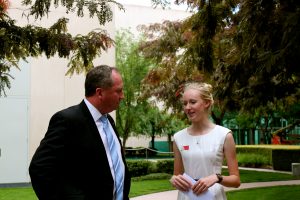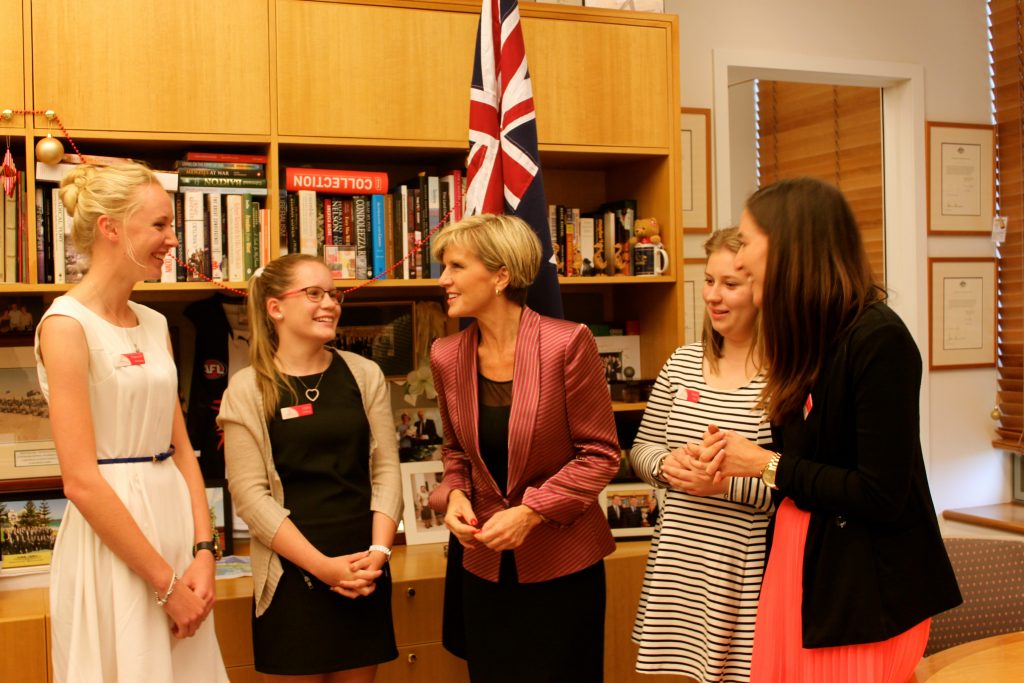
Hannah Worsley is one of the inaugural winners of Country to Canberra’s essay competition on gender equality and empowerment in rural Australia. Following her win, Hannah received an all-expenses paid ‘Power Trip’ to Canberra to meet inspirational leaders on December 3, 2014. Hannah lives on her family farm near Nullamanna in New South Wales, is 17 years old and has ambitions to work in a science (Dr Worsley has a nice ring to it). Below are some of Hannah’s reflections following her journey to the ACT.
Hi, I’m Hannah, and I’m a country bumpkin. Yes, I do own sheep. I can drive a tractor. And just this morning I went mustering on horseback with my dad, who wears an Akubra and Blundstones. I whinge about too much rain, too little rain. My closest neighbour is a kilometre away.
But despite being what many see as the quintessential country girl, I think I’ve been fortunate enough to get a whole lot of experiences outside the rural area in which I live. I’ve been to the city, experienced traffic lights, caught trains and been overseas. But beyond the physical learning experiences, I’ve discovered differences between city and country that lie within the mentality of the people.

Last year (2014), I was lucky enough to be named one of three national winners of the inaugural Country to Canberra Essay Competition, as a result of the essay I wrote on gender inequality in my local area. My essay spoke about the kind of casual sexism that seems to permeate rural communities to a much greater extent than metropolitan ones. To be perfectly honest, I’ve never been told by any individual that hails from the city to “get back to the kitchen” or “go make me a sandwich”, but I barely go a day at my school without hearing it. I’d love to think that they’re referring to my brilliant skills as a chef, but considering that I almost set the grill on fire trying to toast bread in year 7 food tech, I highly doubt it.
In the city, while there are certainly issues with gender equality, it seems like the exposure to various awareness campaigns and political movements prevents people from falling into a false sense of security. People know that what they say in a passing joke can have a broader ripple effect. In the country, it seems we forget that by surrounding our girls with reminders of their predestined path as dutiful domestic damsels in distress, we aren’t exactly helping them achieve their full potential, or feel a sense of equality between themselves and their male peers.

My experiences on the Country to Canberra power trip were eye opening, inspiring, and will not be easily forgotten. All the amazing men and women I had the opportunity to speak to, including Foreign Minister Julie Bishop, have given amazing advice and guidance, including to take risks, don’t settle for something you’re not happy with, follow your own dreams, not other peoples’, and be your own best friend. Through these inspiring individuals, both male and female, I have been given a wide variety of opinions both supporting and challenging my own, and I absolutely loved the fact that there appeared no barriers as a result of my age or gender. However, each person has also voiced concerns about gender inequality, casual sexism, and ingrained patriarchy, and its prevalence in rural areas. And their acknowledgement of, and willingness to discuss the issue, has filled me with nothing but hope for a more equal future.
As a rural girl, I’ve learnt to have a thick skin. That we have to push harder for equality than others. That there are no funny sexist jokes. That sometimes, our more sheltered environment allows the gender gap to spread faster than prickly pear.
But I’ve also learnt that country people are some of the most wonderful and intelligent people there are. That education and exposure can turn the casual sexism into passionate advocation for equality. And that the country bumpkins are just as good as the city slickers.

